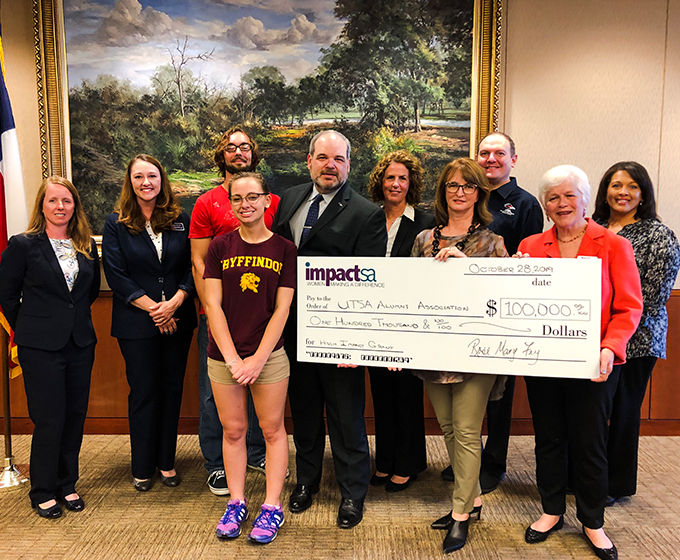How COVID-19 impacts UTSA students with a history of foster care
Students and staff stand with donated check from the Student Alumni Association. Israel Brown, back, third from left, has struggled at times with the transition to online learning caused by COVID-19.
April 17, 2020
Hundreds of thousands of students across the country have been affected by the COVID-19 pandemic and the decisions universities and colleges have made in response to it. Most students participate exclusively in online classes, and many students have had to move back home from campus. While all students have had to face new challenges brought by COVID-19, students with a history of foster care have faced unique struggles, especially because many of these students do not have a traditional familial support structure to assist them during times of high stress and change like this one.
“In general, there is fear of the unknown for moving to a completely remote education and finishing classes online,” Associate Director of the Fostering Educational Success Center (FESC) at UTSA Emily Miller said. “Students [with a history of foster care] are also worried about the implications for income loss during the COVID-19 Stay at Home order, and are worried about meeting their basic needs like shelter, self-care supplies, and food.”
The FESC is “a space dedicated for Roadrunners with a history of foster care” and provides a number of support services to eligible students. The center opened in Fall 2019 and has been serving students with a history of foster care since. Part of the FESC’s goal is to offer these students a community where they can access resources, have a safe place to turn to and receive guidance.
Israel Brown is a senior kinesiology major with a history of foster care who is involved in the FESC. He described how he has handled the recent changes caused by COVID-19.
“It’s been stressful,” Brown said. “At the beginning of the semester my grades were looking really good, but I didn’t have any of the resources for the online transition.”
Brown is concerned about his grades faltering due to the switch to virtual instruction and “compacted” work from professors. He said that, since the initial transition, he has received the resources he needed — like internet access and a laptop — but it “came a little late.”
“I work better in a classroom setting,” Brown said. “It’s been tough.”
Brown was able to receive the resources he needed through the FESC and the Children’s Court College-Bound Docket, a resource that provides mentoring, advocacy and academic support to college students with a history of foster care. The College-Bound Docket was launched in fall 2019 as part of the Bexar County Fostering Educational Success Pilot Project.

Israel Brown is a student with a history of foster care at UTSA. Brown feels he has begun struggling in his classes since the transition to online classes began.
Brown has also received assistance from other members of the FESC student community. When he was in an emergency situation, another student in the FESC, senior psychology major MJ, brought groceries to his apartment. MJ is also a College-Bound Docket advocate.
Miller discussed why she thinks continued communication with students is so critical to her job.
“We speak to our students very regularly to ensure that we can provide the highest level of support to each and every one of them, especially in this time of crisis and disruption,” Miller said.
Brown described the way Miller has assisted him during this transition period.
“I’m registered with Disability Services and most of [my professors] have not given me the extensions recommended by Disability Services, so she reached out to Disability Services on my behalf,” Brown said. “Emily [Miller] has helped a lot.”
The current public health crisis is a uniquely important time for students with a history of foster care to have access to needed resources, and the FESC is trying to ensure that access continues, according to Miller.
“Our Champions across the Student Success division and all over campus have worked tirelessly to give our students the best possible access to online resources, and we are extremely grateful for their support for our students,” Miller said.
These champions, as Miller calls them, are staff members in different UTSA departments designated as points of contact for students with a history of foster care who help guide them to what they need. They are particularly important now when students are in even more stressful situations.
“While we have resources at Campus Services, the Roadrunner Pantry, and some community resources, many of our students are hesitant to access resources outside of a familiar space as they have created safe community within the FESC,” Miller said.
Miller described the different resources available to UTSA students with a history of foster care.
“Students can continue to access resources remotely with the FESC by connecting directly with me,” Miller said. “This includes coaching, access to Emergency Funds, the SIL [Supervised Independent Living] program, and connecting with resources to meet basic needs.”
The emergency funds Miller references are part of the Fostering Educational Success Emergency Fund (FESEF), which is used to support students in the FESC experiencing loss of income, housing struggles and other circumstances that could be detrimental to them. Traditionally, students could access up to $300 of needs-based support per request from the FESEF, but because of the unprecedented nature of the public health crisis students are facing, the FESC has removed that cap.
“We are working on ways to build capacity with our Emergency Fund resource and encouraging folks who are interested in supporting our students to consider donating to this fund so that we can provide our students with increased support at this time,” Miller said.
Brown has not yet utilized the FESEF, but he described Miller’s outreach efforts to inform students of the resources they have access to.
“I haven’t used it yet, but I know that that is available to me,” Brown said. “Emily sent out emails and made sure that we all are aware of the resources that are still available.”
The SIL program, another resource for students with a history of foster care, allows students who have extended their time in foster care until they turn 21 to live in on-campus housing with a meal plan and $90 monthly stipend at no cost to the students. Being in the SIL program was one of the exemptions to the move-out mandate UTSA implemented on March 17, which required most students to leave on-campus housing because of the pandemic.
“All of our SIL students have opted to remain on campus during this transition,” Miller said. “SIL exists for students who have limited options in the community, including housing resources, and our champions in Campus Services as well as leadership within the University have recognized that displacing SIL students could be detrimental on not only physical, mental, and emotional levels, but also compounded by the complexity of the trauma.”
Students with a history of foster care can be some of the most vulnerable to housing disruptions.
“Housing disruption is a traumatic experience that FESC students have experienced prior to coming to UTSA as part of the history of foster care,” Miller said. “We are accepting new placements in SIL should a new Roadrunner be in need of housing and be eligible for the program.”
Miller also touched on the community the FESC tries to foster among students.
“I would also encourage students to join our Facebook group to connect with other Roadrunners and continue to build relationships with each other as we move through this transition,” Miller said.









